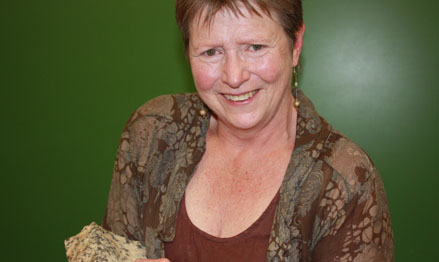Latest News Archive
Please select Category, Year, and then Month to display items
21 April 2021
|
Story Eugene Seegers
|
Photo Supplied
 Adelia Chauque graduated with distinction during the April Virtual Graduations hosted by the UFS.
Adelia Chauque graduated with distinction during the April Virtual Graduations hosted by the UFS.
On 20 April 2021, 693
South Campus students graduated during a
virtual ceremony, with 213 of them achieving distinctions. One of these is
Adelia Chauque, the newly elected South Campus SRC member for Policy and Transformation. During her journey as a student, Adelia says that she had numerous obstacles to overcome. For instance, she mentions that her “biggest challenge was completing my tasks with an unstable data connection during the pandemic”. Despite this impediment, Adelia managed to excel in her studies and obtained her qualification with distinction.
Adelia says her family was her biggest support system. “Due to the network problems that I faced my family had to drive me around until we found a stable connection that enabled me to write my tests.” Other support came from the university itself. “I received a lot of support from the academic adviser, Mr Chwaro Shuping,” she says. “Although he couldn't arrange for me to return to campus, he called regularly to ensure that I was still academically active.”
After overcoming these hurdles, Adelia is continuing her academic journey. “I am enthusiastic and eager to learn or to better myself. Due to that, I am furthering my studies by enrolling for a second degree programme in
Administration majoring in Industrial Psychology. I am very ambitious, in the sense that I strive for perfection and consistency with an organised and maintainable future, therefore being part of the SRC enables me to assist students and myself with a secured and comfortable learning environment to achieve our goals at the institution.”
Adelia balances her responsibilities in the SRC portfolio of Policy and Transformation on the South Campus by having a schedule planned that ensures she does not fall behind. She concludes, “During the morning, I attend my prescribed lectures to ensure that I will continue to slay academically. Then I am visible in the SRC office from 12:00 to 16:30. After hours, I contribute my time to study, but I remain available to students who prefer texting.” The university is keen to see the heights to which Adelia will attain in the coming years.
“I am enthusiastic and eager
to learn or to better myself.”
Adelia Chauque, South Campus SRC:
Policy and Transformation.
Prof Tredoux turns theories regarding the formation of metals on its head
2013-09-17
|
 |
|
Prof Marian Tredoux
17 September 2013 |
The latest research conducted by Prof Marian Tredoux of the Department of Geology, in collaboration with her research assistant Bianca Kennedy and their colleagues in Germany, placed established theories regarding how minerals of the platinum-group of elements are formed, under close scrutiny.
The article on this research of which Prof Tredoux is a co-author – ‘Noble metal nanoclusters and nanoparticles precede mineral formation in magmatic sulphide melts’ – was published in Nature Communications on 6 September 2013. It is an online journal for research of the highest quality in the fields of biological, physical and chemical sciences.
This study found that atoms of platinum and arsenic create nanoclusters, long before the mineral sperrylite can crystallise. Thus, the platinum does not occur as a primary sulphur compound. The research was conducted at the Steinmann Institute of the University of Bonn, Germany, as well as here in Bloemfontein.
Monetary support from Inkaba yeAfrica – a German-South African multidisciplinary and intercultural Earth Science collaborative of the National Research Foundation (NRF) – made this research possible. Studies are now also being conducted on other metals in the precious metal group, specifically palladium, rhodium and ruthenium.
The discovery of the nanoclusters and the combination with arsenic can have far-reaching consequences for the platinum mine industry, if it can be utilised to recover a greater amount of platinum ore and therefore less wastage ending up in mine dumps. This will signify optimal mining of a scarce and valuable metal, one of South Africa’s most important export products.
For Prof Tredoux, the research results also prove thoughts she already had some twenty years ago around the forming of platinum minerals. “Researchers laughed in my face, but the evidence had to wait for the development of technology to prove it.” Young researchers were very excited at recent congresses about the findings, since the new models can bring new insights.
“Chemistry researchers have been talking about platinum element clusters in watery environments for quite a while, but it was thought that these would not appear in magmas (molten rock) due to the high temperatures (>1 000 degrees celsius).”
Prof Tredoux has already delivered lectures at congresses in Scotland, Hungary, Sweden and Italy on this research.
Read the article at: http://www.nature.com/ncomms/2013/130906/ncomms3405/full/ncomms3405.html